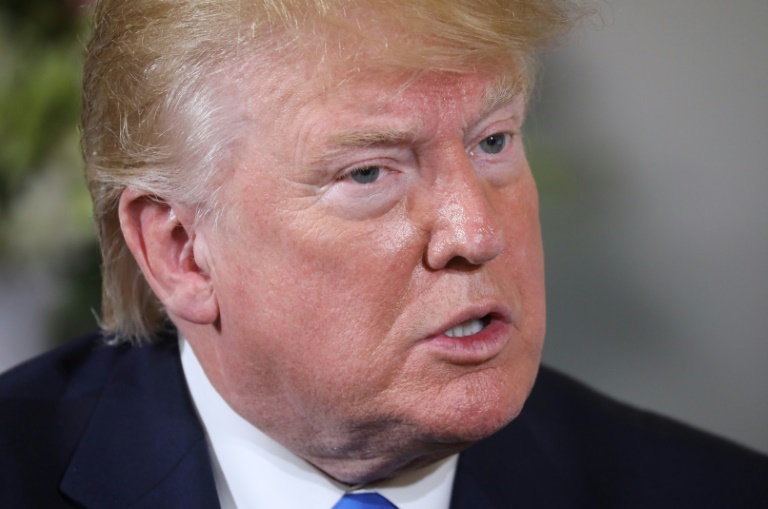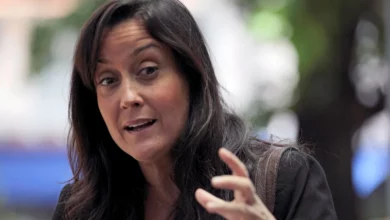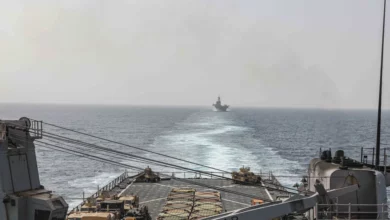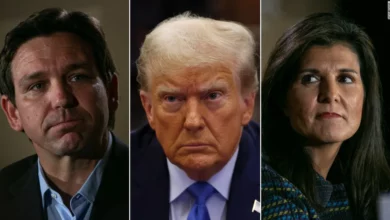
Mexico scrambled Thursday to slow the flow of Central American migrants to the United States as talks continued in Washington to head off President Donald Trump’s threat of potentially catastrophic tariffs on Mexican goods.
Mexico City was deploying 6,000 National Guard troops to its southern border with Guatemala, blocked hundreds of migrants in a new caravan and froze the bank accounts of suspected human traffickers in hopes of appeasing Washington’s demands.
But in the US capital, negotiators holding a second day of talks were still trying to find agreement on issues including asylum application procedures and financial aid to the Central American countries that are the source of most of the migrants.
“We have been working this afternoon, we still do not have an agreement,” Mexican Foreign Minister Marcelo Ebrard said as talks wrapped for the day. “Tomorrow we have another session in the morning and we will continue forward.”
With migrant apprehensions at the border with Mexico soaring to 144,000 in May, the highest number in 13 years, the Trump administration has threatened to hit all imports from Mexico with a five percent tariff starting Monday, a move that could savage the export-dependent Mexican economy.
Trump made the threat last week, saying that the tariffs would rise by five percentage points each month to a high of 25 percent if the southern US neighbor fails to halt the northward flow of migrants.
In an interview that aired late Thursday with Fox News from France where he is attending D-Day commemorations, Trump defended his tariff plan as “a beautiful thing” and complained about “this onslaught, this invasion” of undocumented migrants.
“That’s really an invasion without guns,” Trump told interviewer Laura Ingraham.
The president hesitated when Ingraham pointed out that Mexico was an important US trade ally.
“How do you define ally?” he asked, then talked about violence and drugs coming into the United States from Mexico.
“They shouldn’t be allowing people to come through their country from Central (America), from Honduras and Guatemala, (and) El Salvador,” he said.
Trump was unconcerned that pushback in Congress over the tariffs could sink his new North America trade deal, the USMCA, which needs legislative approval. “I’m not worried about it because they need us, we don’t need them,” he said.
No deal yet
Ebrard declined to comment on whether the talks at the State Department revisited the so-called “safe third-country” option proposed by the United States, which aims at having Central American migrants fleeing chronic poverty and violence apply for asylum from Mexico rather than in the United States.
Earlier in the week Ebrard rejected the idea, but the White House declared it one of its principal demands.
The Washington Post reported that a potential deal to avoid the tariffs would allow the United States to deport asylum seekers from Honduras and El Salvador to Guatemala, which they pass through to get to Mexico and then the United States.
Ebrard’s spokesman Robert Velasco Alvarez said Thursday that there was no deal as the two sides were far apart, but that talks continue.
“The US position is focused on migrant control measures, ours is on development,” he said, referring to Mexico’s support of a broader effort to support the economies of Honduras, El Salvador and Guatemala.
At Mexico’s southern border Thursday, there were visible efforts to slow the migrants and hinder their supporters.
In the southern state of Chiapas, AFP journalists reported an increased police and military presence on roads typically used by migrants heading north. Ebrard confirmed that 6,000 National Guardsmen would be deployed to the border.
Mexico City froze the bank accounts of 26 suspected human traffickers allegedly responsible for organizing US-bound migrant caravans.
Two activists from People Without Borders (Pueblo Sin Fronteras), which has helped organize migrant caravans, were arrested on allegations of offering migrants money to enter Mexico illegally.
Mexican authorities also blocked 420 migrants in a new caravan, although the group was initially about 1,200-strong, with many suspected of running away before immigration officials stepped in.
Asylum not the problem
Meanwhile Carla Provost, the head of the US Border Patrol, downplayed the issue of asylum, saying migrants simply understand that, due to US laws, if they arrive with children, they will likely be released into the United States.
She noted that since October, 230,000 children without legal travel documents have crossed the border into the United States, most with families but also tens of thousands unaccompanied by adults.
“The issue is they don’t even have to claim asylum, they know that,” Border Patrol chief Carla Provost told CNN.
“They are telling us they are told by smugglers, they are hearing announcements in their own country, that if they come right now and bring a child, they will be released,” she said.
“That is a true statement, because we cannot hold them longer than 20 days if they have a child.”
Image: POOL/AFP / Ludovic MARIN US President Donald Trump says Mexico has to crack down on migrants if it hopes to avoid Washington placing a five percent tax on all Mexican imports




